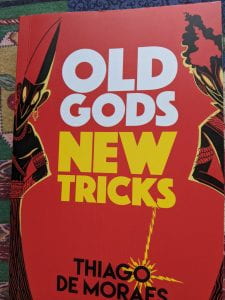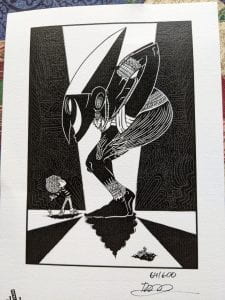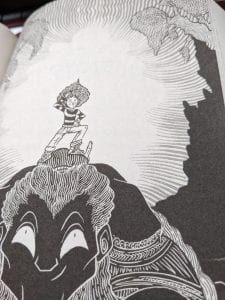Like many people of my generation I grew up reading about the various mythologies that were common at the time. These included Roman, Greek, Egyptian and Norse myths and gods, but what was missing were the mythologies of other parts of the world. It was only when I became a teenager that I began to hear about South American, Asian, African and then American stories. However, these are not myths that are widely known or written about and it is only in the last few years that people have felt able to write about their cultural beliefs and histories; or at least that is my perception, so I apologise if I am wrong about this. I was delighted to read this wonderful story of the Trickster gods, a concept that seems to appear in so many mythologies but about whom I had little knowledge, apart from Loki who is a favourite character at the moment.
mythologies of other parts of the world. It was only when I became a teenager that I began to hear about South American, Asian, African and then American stories. However, these are not myths that are widely known or written about and it is only in the last few years that people have felt able to write about their cultural beliefs and histories; or at least that is my perception, so I apologise if I am wrong about this. I was delighted to read this wonderful story of the Trickster gods, a concept that seems to appear in so many mythologies but about whom I had little knowledge, apart from Loki who is a favourite character at the moment.
The main character, Trixie dos Santos definitely lives up to her name and as the story begins she is getting a final warning from her headteacher and is threatened with expulsion. At that moment all electricity stops functioning and the world is without lights, computers and in fact anything that depends on this source of power. As life becomes increasingly difficult for everyone, Trixie decides that it is the old gods who have taken the electricity away an she needs to find a way to trick them into giving it back; the answer is to get the trickster gods to help, something that is a huge challenge, even if she can get them to answer her pleas. What follows is something of a roller-coaster ride as Trixie and her companions follow the trail that will lead them to the other gods and hopefully success in giving electricity back to the world.
What a fabulous take on the world of myths and legends. The trickster gods all have their own little quirks and a real sense of attitude, so that we really enjoy their antics and the interaction between them. We also see these gods develop a real feeling of friendship with our young heroine, which means they start working together as an approximation to a team. Trixie is a really feisty young girl who learns a lot through the adventures that she goes through. There is a lot of growing up and an understanding that life does not always change in the ways you imagine when you start on a journey. The author is also a very talented artist and his illustrations for the book really focus on the wide ranging cultures that are represented; the black and white images really add to the overall sense of foreboding that we feel as the world begins to descend into darkness. This story also highlights the dependence that this world has on the use of electricity. Even for those of us who grew up without computers, mobile phones and other digital
real sense of attitude, so that we really enjoy their antics and the interaction between them. We also see these gods develop a real feeling of friendship with our young heroine, which means they start working together as an approximation to a team. Trixie is a really feisty young girl who learns a lot through the adventures that she goes through. There is a lot of growing up and an understanding that life does not always change in the ways you imagine when you start on a journey. The author is also a very talented artist and his illustrations for the book really focus on the wide ranging cultures that are represented; the black and white images really add to the overall sense of foreboding that we feel as the world begins to descend into darkness. This story also highlights the dependence that this world has on the use of electricity. Even for those of us who grew up without computers, mobile phones and other digital  resources , it is still difficult to imagine going back to the days before this source was available. In a real sense this book provides a call to look after our natural resources and not squander what we have.
resources , it is still difficult to imagine going back to the days before this source was available. In a real sense this book provides a call to look after our natural resources and not squander what we have.
Thiago de Moraes
I’ve been fascinated with myths and legends since I was a very young kid in Brazil. I was fortunate to grow up in a house where there were lots of books lying around, on all sorts of subjects. Most weren’t children’s books, but my parents didn’t mind me reading them, and that’s how I discovered a lot of the mythologies that still captivate me today. Since then, my curiosity and respect for these extraordinary worlds has only grown; I have read many other books, spoken to lots of people and tried to visit and experience as many sites from different cultures as I can.
The first book I remember becoming obsessed with as a child was a large, illustrated edition of ‘Lendas Africanas dos Orixás’*, by Pierre Verger. He was a photographer, anthropologist and ethnographer who studied the myths of the Yoruba people from Western Africa and their counterparts in the African diaspora in the Americas. It was a collection of legends of the Orisha, Yoruba deities, which I found both awesome and a quite frightening. That’s where I first met Exú, also known as Eshu, Elegba and many other names, the god of beginnings, crossroads, mischief and much more. He was the first trickster I thought about having in the book (as it’s his right) and a lot of the plot developed from his presence.
Loki, Maui and Sun Wukong are there for the same reason. I’ve known them for a long time, so I felt like they were old friends that I could invite to join in an adventure (much like Trixie, the book’s protagonist, does.) What attracts me to tricksters, beyond their rebellion and creative force, is how fun their stories are. Humour can sometimes be hard to find in myth, so these tales have always stuck with me. Finally, I learned of Huehuecóyotl (and countless other gods I hadn’t know about) whilst researching a non-fiction book I wrote called Myth Atlas, which features lots of stories from different societies.
old friends that I could invite to join in an adventure (much like Trixie, the book’s protagonist, does.) What attracts me to tricksters, beyond their rebellion and creative force, is how fun their stories are. Humour can sometimes be hard to find in myth, so these tales have always stuck with me. Finally, I learned of Huehuecóyotl (and countless other gods I hadn’t know about) whilst researching a non-fiction book I wrote called Myth Atlas, which features lots of stories from different societies.
All the cultures from which the trickster tales that inspired Old Gods New Tricks come from – Yoruba, Ancient Norse, Polynesian, Chinese and Aztec – are immensely rich and culturally complex. They’re also very different from each other; it’s impossible to sum up all the things that drew me to them, but a common aspect, which I was mesmerized by, is the sense of vitality we get from them. Even though they have deeper meanings and play important roles in religion and ritual, they are also brilliant stories, full of the wonder and confusion of life, and present us with worlds that, although supernatural, are also instantly familiar.
I hope that readers that enjoy Old Gods New Tricks will continue on their own adventures and discover more about these cultures, their myths and legends. There are lots of brilliant places to start, but few are better than your local library or bookshop.
*African Legends of the Orisha
Thank you Thiago for this insight into your work, it is totally fascinating and will hopefully inspire readers to look deeper into the characters you have used.
“Old Gods, New Tricks
David Fickling Books, 9781788452953, £7.99
